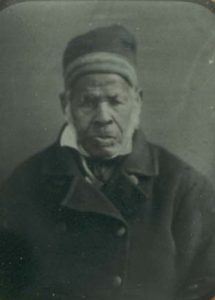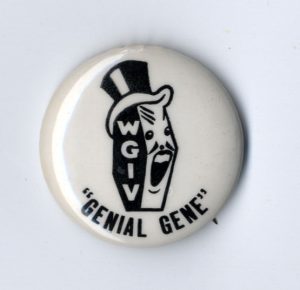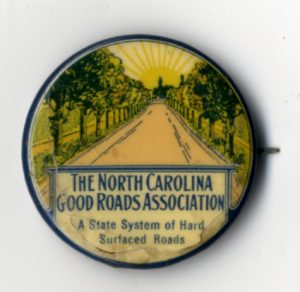The Black Student Movement was established by African American students in November of 1967 as a result of their dissatisfaction with the campus NAACP chapter as well as the slow growth of the African American student population at UNC. UNC’s Virtual Museum, a growing online exhibit that focuses on UNC history, has just published an exhibit that recounts the story of the Black Student Movement at Carolina.
Month: November 2010
North Carolina remembers Omar ibn Said
“There came to our place a large army, who killed many men, and took me, and brought me to the great sea, and sold me into the hands of the Christians, who bound me and sent me on board a great ship and we sailed upon the great sea a month and a half, when we came to a place called Charleston in the Christian language. There they sold me to a small, weak, and wicked man called Johnson, a complete infidel, who had no fear of God at all. Now I am a small man, and unable to do hard work so I fled from the hand of Johnson and after a month came to a place called Fayd-il [Fayetteville]….”
-From Autobiography of Omar ibn Said, 1831..
Omar ibn Said was brought to the United States as a slave in about 1807. After fleeing Charleston for Fayetteville, he was recaptured and jailed for 16 days. Eventually he was moved to the Bladen County plantation of James Owens, who represented North Carolina in the U.S. Senate from 1817-1819 and served as president of the Wilmington-Raleigh Railroad. Omar, known as “Moro” to the Owen family, remained a slave on the Bladen County plantation until his death in 1863, at about the age of 93. Prior to enslavement, Omar was educated in Koranic schools in present-day Senegal. He gained fame in North Carolina for his distinct dress and intelligence. A devout Muslim, Omar began attending services at a Presbyterian church in Fayetteville with the Owens family and was touted as a convert to Christianity. Scholars now dispute that fact. The English language version of Omar’s autobiography, originally written in Arabic, was published in 1831.
The state recently erected a Highway Historical Marker honoring Omar(after clicking on the link, select “Marker I-89”).
The Museum of the Cape Fear in Fayetteville is presenting an exhibit on the life of Omar ibn Said through Dec. 5.
Scholar Allan D. Austin will speak on African Muslims in the ante-bellum South, including Omar ibn Said, at Davidson College on Nov. 14
‘Setting the pace for others to trace’
Eugene “Genial Gene” Potts, one of the “Original 13” black radio announcers in the South, began his 30-year career at Charlotte’s WGIV (“We’re G.I. Veterans”) in 1948.
His trademark was a rhyming, rap-like patter invented to overcome a stammer — as in “We’re setting the pace for others to trace.”
A man sought for killing a police officer once walked into WGIV and proposed a deal: Play a song for my mama and I’ll surrender. Potts played it, then dialed the cops. The man went peacefully.
Isn’t this a cool design? Wish I knew who did it.
Unlike Panthers, link dump works Sundays
— Amy Sedaris says no thanks to North Carolina turkey feathers.
— Before the Stevens Center was the Stevens Center….
— Discovery Channel sees a Whiteville man about a log.
— Baba Ram Dass: My son, the Greensboro capitalist.
Grab a shovel, everybody — you too, Raleigh
On this day in 1913: As part of his proclaimed Good Roads Days, Gov. Locke Craig, clad in overalls, takes up a shovel on a Buncombe County work crew.
Craig’s call for two days of volunteer maintenance on the state’s dirt roads elicits mixed response. In Guilford County more than 1,000 men show up; students at State Normal and Industrial School for Girls put 400 rakes to use. At Chapel Hill, acting UNC president Edward Kidder Graham takes the lead in leveling Franklin Street. Lenoir College students, according to The Charlotte Observer’s correspondent, “livened up the occasion by giving cheer after cheer for Hickory and Governor Craig.”
In Raleigh, however, “There was practically no response on the part of citizenship. . . . ”
Pictured: From the Good Roads lobby, a gorgeously utopian pinback button.
You’re invited…
We’ve got a busy week coming up at the North Carolina Collection and we’re hoping you’ll join us for some of our activities.
On Monday (Nov.8), we’ll celebrate the publication of The Good Government Man: Albert Coates and the Early Years of the Institute of Government. Prize-winning North Carolina author Howard Covington has written a fascinating biography of Coates, the founder and first director of the Institute of Government at UNC. The Good Government Man depicts Coates’s striking originality and his sometimes exasperating determination. Among the notable figures making appearances in the book are novelist Thomas Wolfe; U.S. senators Frank Porter Graham and Sam Ervin, Jr.; state supreme court justice Susie Sharp; F.B.I. director J. Edgar Hoover; and every North Carolina governor from Locke Craig to Terry Sanford.
We’re particularly excited about the book because it’s published by us — the North Carolina Collection. It’s the first in our Coates Leadership Series, books that we plan to release in the coming years that document some of the University’s great leaders.
There’s more on our book release event here.
On Wednesday (Nov. 10), we’ll celebrate North Carolina’s American Indians with several events. As you may know, our state is home to the largest population of Native Americans east of the Mississippi. We’ve assembled a panel of experts to discuss some of the issues affecting American Indians in 21st-century North Carolina. The panel is moderated by Dr. Clara Sue Kidwell, director of UNC’s American Indian Center. Panelists include:
• Thomas N. Belt, Cherokee language instructor, Western Carolina University;
• Edward K. Brooks, attorney and legal counsel to the Lumbee Tribe of North Carolina;
• Beckee Garris, staff, Catawba Indian National Tribal Historic Office;
• Theda Perdue, Ph.D., Atlanta Distinguished Professor of Southern Culture in UNC’s history department; and
• Gregory A. Richardson, executive director, North Carolina Commission on Indian Affairs.
We’ll also be featuring a demonstration by two Catawba Indian potters. Both events coincide with the opening of our NCC Gallery exhibit “Unearthing Native History: The UNC Catawba Archaeological Project.”
No R.S.V.P. required for either event. Just show up and enjoy.
Link dump: Mind-reading from 150 years away
— What was his great-great-great grandfather thinking?
— A play about Harriet Jacobs, a film about Carl Sandburg.
— Death noted: Clyde King, whose long baseball career began with an overnight transformation from Tar Heel to Brooklyn Dodger.
— Roadside marker in Fayetteville is state’s first to recognize a Muslim.
— Lost Colony researcher‘s “two drops of Croatoan blood… have boiled over.”
He led ‘fanatical cult’ of home freezer owners
“Last year Americans ate nearly a billion pounds of commercially frozen foods. About a half-billion more pounds were stored in 5,000 cold-locker plants by some 1,500,000 U.S. families. The quick-freezing boom is growing fast. Last week magazine Writer Boyden Sparkes published a book predicting the next big move will be toward freezing and storage in the home (“Zero Storage in Your Home”).
“Many food technologists believe that after the war quick freezing will supplant canning and dehydration. To Zealot Sparkes, such speculation is overcautious. He asserts that food freezing may revolutionize the U.S. standard of living. City people will buy their food wholesale. People ‘in modest circumstances,’ Sparkes glows, ‘may eat cheaply such meals as heretofore were available only to rich gourmets.’ Farm families will have an easily preserved, tasty winter supply of their own produce.
“Author Sparkes has a 26-cubic-foot freezer on his North Carolina farm, keeps it stuffed with whole lamb carcasses, chickens, cream, sweet corn, grapes, strawberries, quail, pigeons…. He also keeps in touch with other members of the small but fanatical cult of U.S. citizens who own home freezers.”
— From Time magazine, June 26, 1944
Boyden Sparkes is a name familiar to followers of the Dare Stones saga — he wrote the 1941 Saturday Evening Post expose. And he coauthored autobiographies for carmakers Alfred Sloan and Walter Chrysler, celebrity chef Henri Charpentier and heiress Evalyn Walsh McLean, last private owner of the Hope Diamond and last victim of con man Gaston B. Means.
Anybody know more about the wide-ranging Mr. Sparkes?
North Carolina Politics In The 1890s
In this morning’s Raleigh News and Observer, political columnist Rob Christensen, who was commenting on yesterday’s elections, pointed out that the last time the North Carolina General Assembly was led by Republicans was “in 1898 when lawmakers arrived in horse and buggy or by train.”
Why did Christensen bring up the 1890s? What happened then? Why do we still remember the change? You can read more about it at LEARN NC’s North Carolina history digital textbook:
Elizabeth City welcomes Margaret Sanger
On this day in 1919: In Elizabeth City, Margaret Sanger delivers the South’s first public lecture on birth control.
Sanger, a New Yorker invited by maverick newspaper editor W.O. Saunders, will recall later that she was skeptical of her reception “in a city in which not even a suffragist had delivered a public lecture. To my delight, however, I found that people, both black and white . . . were so eager to know about birth control that every possible moment of my time was given to speaking. . . .
“Never have I met with more sympathy, more serious attention, more complete understanding than in . . . this Southern mill town.”




